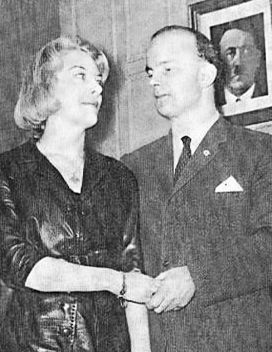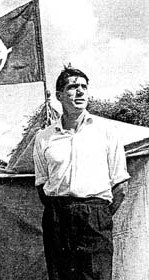Related Research Articles

John Hutchyns Tyndall was a British fascist political activist. A leading member of various small neo-Nazi groups during the late 1950s and 1960s, he was chairman of the National Front (NF) from 1972 to 1974 and again from 1975 to 1980, and then chairman of the British National Party (BNP) from 1982 to 1999. He unsuccessfully stood for election to the House of Commons and European Parliament on several occasions.

The National Front (NF) is a far-right, fascist political party in the United Kingdom. It is currently led by Tony Martin. As a minor party, it has never had its representatives elected to the British or European Parliaments, although it gained a small number of local councillors through defections and it has had a few of its representatives elected to community councils. Founded in 1967, it reached the height of its electoral support during the mid-1970s, when it was briefly England's fourth-largest party in terms of vote share.
John Kingsley Read was a British fascist politician and Holocaust denier. He was chairman of the National Front (NF) from 1974 until 1976, when he founded the National Party.

John Colin Campbell Jordan was a leading figure in post-war neo-Nazism in Great Britain. In the far-right circles of the 1960s, Jordan represented the most explicitly "Nazi" inclination in his open use of the styles and symbols of Nazi Germany. Through his leadership of organisations such as the National Socialist Movement and the World Union of National Socialists, Jordan advocated a pan-Aryan "Universal Nazism". Although later unaffiliated with any political party, Jordan remained an influential voice on the British far right.

The White Defence League (WDL) was a British neo-Nazi political party. Using the provocative marching techniques popularised by Oswald Mosley, its members included John Tyndall.
John Edward Bean was a British political activist and writer, who was a long-standing participant in far-right politics in the United Kingdom, and a number of its movements.

Andrew Fountaine was an activist involved in the British far right. After military service in a number of conflicts Fountaine joined the Conservative Party and was selected as a parliamentary candidate until his outspoken views resulted in his being disowned by the party.
The Constitutional Movement was a right wing political group in the United Kingdom. It was formed in 1979 by Andrew Fountaine as the National Front Constitutional Movement, a splinter group from the National Front. Offering a more moderate alternative to the NF, the Constitutional Movement claimed to have 2,000 members by 1980.
The Greater Britain Movement was a British far right political group formed by John Tyndall in 1964 after he split from Colin Jordan's National Socialist Movement. The name of the group was derived from The Greater Britain, a 1932 book by Oswald Mosley.
Martin Guy Alan Webster is a British neo-nazi, a former leading figure on the far-right in the United Kingdom. An early member of the National Labour Party, he was John Tyndall's closest ally, and followed him in joining the original British National Party, the National Socialist Movement and the Greater Britain Movement. Webster also spent time in prison for helping to organise a paramilitary organisation, Spearhead, and was convicted under the Public Order Act 1936. Rumours of his homosexuality led to him becoming vilified in far-right circles, and he quietly disappeared from the political scene.
Anthony Reed Herbert was a leading member of the British National Front (NF) during the 1970s, organising the party in Leicester and serving as its chief legal adviser.
John O'Brien was a leading figure on the far right of British politics during the early 1970s.
The National Independence Party was a minor far-right party that appeared in British politics during the 1970s. The party was led by John Davis and campaigned on a platform similar to that of the much bigger National Front (NF) on anti-immigration, anti-European Economic Community, anti-communism themes.
The National Democratic Party (NDP) was a right wing political party that operated in the United Kingdom during the 1960s and 1970s. The NDP sought to position itself as an early rival to the National Front although ultimately it failed to challenge the position of this group.
Denis Pirie is a veteran of the British far right scene who took a leading role in a number of movements.
Roy Painter was a former leading figure on the British far right.
The Racial Preservation Society was a far-right pressure group opposed to immigration and in favour of white nationalism, national preservation and protection in the United Kingdom in the 1960s.
The history of the National Front, a far-right political party in the United Kingdom, began in 1967, when it was founded by A. K. Chesterton.
The Ideology of the National Front comprises the beliefs held by the National Front, a far-right political party in the United Kingdom. These beliefs, including nationalism, racism, and opposition to Marxism, have been compared to fascism, although the party rejected the term as a description of its political stance.
References
- A. Sykes, The Radical Right in Britain Palgrave, 2005
- S. Taylor, The National Front in English Politics, London: Macmillan, 1982
- M. Walker, The National Front, Glasgow: Fontana Collins, 1977 (Revised Edition 1978)